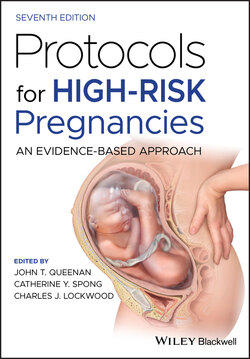Читать книгу Protocols for High-Risk Pregnancies - Группа авторов - Страница 26
Complications
ОглавлениеTobacco use not only impacts the health of the mother and fetus but carries over into the postnatal period. Pregnancies among women who smoke cigarettes have been associated with increased risks for miscarriage, ectopic pregnancy, fetal growth restriction, placenta previa, abruptio placentae, preterm birth, premature rupture of the membranes, and low birthweight. In a recent metaanalysis reviewing 142 studies, any smoking during the pregnancy increased the risk of stillbirth by approximately 50% and risk of neonatal death by 20%. There appears to be a dose–response relationship, with heavy smokers having the greatest risk.
The offspring of smoking mothers face additional risks during childhood. There is a strong association between maternal smoking and sudden infant death syndrome, and again, a clear dose–response relationship has been demonstrated. Prenatal and postnatal tobacco smoke exposure has also been associated with increased risk of reduced lung function, respiratory infections, and asthma in the children. Recent studies suggest that infants born to women who smoke during pregnancy may be at increased risk for childhood obesity, as well as other metabolic dysfunctions, likely through a developmental programming effect. In addition, there is evidence suggesting a neurotoxic effect of prenatal tobacco exposure on newborn behavior, i.e., being more excitable and hypertonic. The behavioral and cognitive deficits associated with in utero exposure to tobacco seem to continue into late childhood and adolescence with increased risk for attention‐deficit hyperactivity disorder and conduct disorder.
In addition to nicotine exposure, e‐cigarette use has been associated with an additional risk. An acute, severe respiratory distress syndrome has been identified in individuals using e‐cigarette products. Over 2000 e‐cigarette or vaping product use‐associated lung injury (EVALI) events were reported by the CDC in the US in 2019. The exact etiology of the lung injury is unknown but vitamin E acetate exposure may play a role in the development of EVALI. Pregnant women are at higher risk for severe outcomes with EVALI, therefore these products should not be used in pregnancy.
